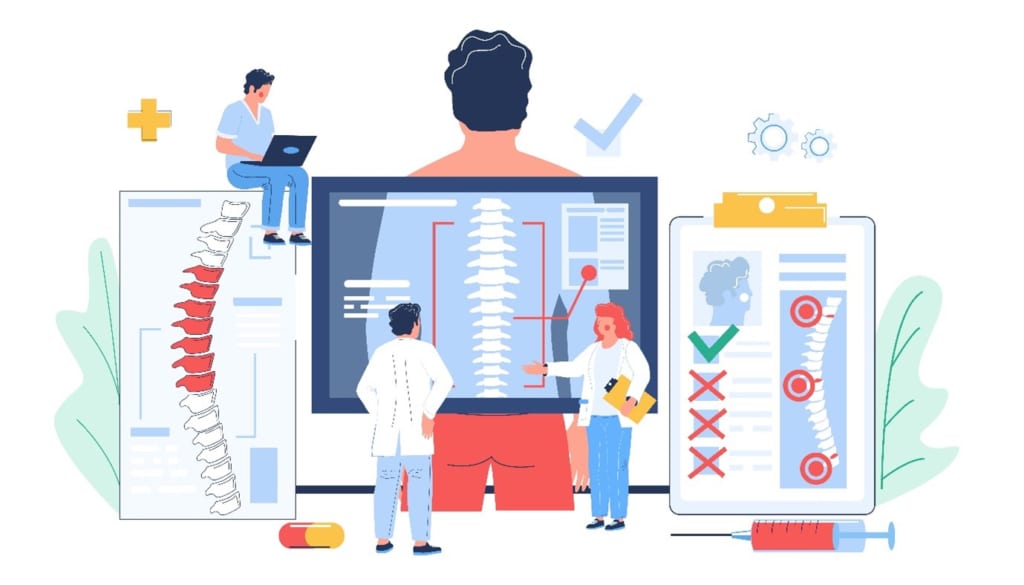
Herniated discs are not only a problem of the elderly but are increasingly common among young people. This condition causes pain and limits mobility, if not detected and treated in time, the disease can easily lead to dangerous complications, affecting the quality of life.
I. Health information: Herniated disc is trending more and more young, how to treat it?
1. Definition
Herniated Disc is a condition in which the nucleus pulposus of the spinal disc escapes from the fibrous annulus, pressing on the nerve roots or spinal cord, causing symptoms of pain and numbness. This condition is often caused by injury or degeneration of the intervertebral disc, and can occur in any segment of the spine, most commonly in the lumbar spine.
Based on the location of the displaced disc, the disease is divided into:
- – Cervical Herniated Disc
- – Cervical thoracic Herniated Disc
- – Thoracic Herniated Disc
- – Lumbar Herniated Disc
- – Lumbar Herniated Disc
2. Causes of Herniated Disc in young people
According to statistics from the Ministry of Health, the rate of people with Herniated Disc is quite high, accounting for about 30% of the population. Some reasons why this disease tends to “rejuvenate” include:
- – Overweight and obese: Large body weight puts pressure on intervertebral discs, especially in the lumbar spine.
- – Wrong activities and posture: Doing heavy work, sitting in the wrong posture, standing or sitting for too long for long periods of time.
- – Injury: Injury due to activities, work, sports or traffic accidents.
- – Aging and degeneration: The natural aging process causes discs to lose water and become vulnerable.
- – Genetic factors and congenital diseases: Congenital or acquired diseases of the spine such as kyphosis and spinal degeneration.
- – Unscientific living habits: Sleeping with your head too high, carrying a heavy bag on one shoulder for a long time, and other unhealthy living habits also contribute to Herniated Disc.
In general, there are many reasons why people suffer from herniated discs. The disease is not limited to the elderly, but also occurs in young people, especially in today’s life when working in the office, when sitting in the wrong position and sitting for long periods of time.

3. Subjects susceptible to disease
Not only is it a common issue among young office workers, but nowadays, symptoms of the condition have also appeared in university students still sitting in lecture halls. Young people should pay attention especially to the following subjects who are at very high risk of Herniated Disc:
- – Unskilled workers: Must continuously carry heavy loads or work in the wrong posture.
- – People with specific jobs: Standing or sitting in one position for too long, such as students, receptionists, drivers, tailors, teachers, engineers, architects, office workers.
- – People with unscientific living habits: Sleeping with their head too high, carrying a heavy bag on one shoulder for a long time.
- – Athletes and dancers: Sudden changes in posture cause disc damage.
- – Overweight and obese people: Creates great pressure on the lumbar spine leading to lumbar Herniated Disc.
4. What symptoms does Herniated Disc in young people cause?
Many young people, confident in their strength, tend to ignore persistent pain in the neck or lower back. This complacency, if left unchecked, can lead to serious health conditions over time, with Herniated Discs being one of the most common and difficult to treat.
Some typical symptoms of Herniated Disc include:
- – Pain in the arms or legs: Patients experience sudden pain in the neck, waist, shoulders, and limbs. The pain can range from dull, lasting a few days, weeks, or months, to very intense, and increases with movement or walking, but decreases with rest.
- – Symptoms of numbness limbs: Pain and numbness in the waist and neck, then spreads to the buttocks, thighs, legs and heels.
- – Sensory disorders: Loss of feeling in the so-called “saddle” areas of the body such as the inner thighs, the back of the legs, and the area around the anus. Patients may have sensory disorders, feeling like there are ants crawling inside their body.
- – Sphincter disorders: Damaged nerve roots affect the urinary sphincter, leading to urinary retention, followed by bedwetting, with urine leaking passively.
- – AND muscle weakness, paralysis: Appears when the disease is in a severe stage and is often discovered after a long time. The patient has difficulty in talking movement gradually leads to muscle atrophy, leg atrophy, and possibly limb paralysis, forcing the patient to use a wheelchair.

5. Treatment methods for Herniated Disc
A herniated disc can be treated effectively, but complete cure depends on the severity of the disease and the treatment method applied. Here are some common treatments:
- – Internal medicine treatment
- + Medication: Medications used include pain relievers, muscle relaxants and epidural blockade corticosteroids. Patients need to comply with the dosage and usage instructions of the treating physician.
- + Epidural Steroid injection: purpose of pain relief and swelling reduction. The doctor will take an X-ray, CT scan or MRI to find the appropriate injection site.
- – Physical therapy
- + Stretching exercises: These exercises help improve the condition by increasing the flexibility and strength of the muscles around the spine.
- + Acupuncture, acupressure, joint adjustment: These methods help return misaligned discs to their original position and effectively reduce pain. Patients should go to reputable facilities to ensure safety and effectiveness of treatment.
Although a herniated disc may not be completely cured in all cases, with the right treatments and lifestyle changes, people can control symptoms and significantly improve their quality of life.
6. Prevention and management of Herniated Disc
Patients can take several measures to prevent Herniated Disc as follows:
- – Change positions frequently: Avoid staying in one position for many hours at a time. Sit and stand straight to reduce pressure on the spine.
- – Move properly: When lifting heavy objects, bend your knees, keep your back straight and carry the object closest to your body. Avoid twisting your spine or lifting objects that are too heavy.
- – Exercise regularly: Train your body to make your spine strong and flexible. Perform exercises that are suitable for your physical condition and consult your doctor if necessary.
- – Proper nutrition: Eat scientifically, increase foods rich in calcium, vitamin D, and omega-3 to improve the strength of discs and bones and joints.
- – Maintain a stable weight: Avoid gaining too much weight to reduce pressure on the spine.
- – Avoid smoking: Smoking causes hardening of the arteries and damage to the intervertebral discs.
- – Take supportive measures: If you must stand for a long time, put your feet on something to reduce pressure on your back. Avoid lying down for too long, take a short rest then get up and do light activities.
These measures will help protect the spine and effectively prevent the risk of Herniated Disc. Herniated Disc is a common disease in Vietnam, with a rate of up to 30% of the population. Treating this disease takes a lot of time, effort and money. Therefore, as soon as there are warning signs, patients need to go to a Musculoskeletal specialist for appropriate diagnosis and treatment to prevent the disease from progressing seriously.
Reference: benhvienthucuc.vn; acc.vn; vinmec.com and suckhoedoisong.vn
II. Introducing Insmart Services: Medical Second Opinion (MSO)
Insmart has cooperated with MediGuide since 2015 to bring members the opportunity to experience MSO services. MediGuide is a leading medical consulting service provider in the world, headquartered in the US and a partner of the WCMC organization (World Leading Medical Center Organization). MediGuide is active in more than 60 countries with millions of members across 152 countries.
A Medical Second Opinion (MSO) is a review of the diagnosis and treatment plan requested by a patient from a telehealth provider, who is not the primary physician or facility. Surname. Through the MSO service, when diagnosed with a disease, Members will receive support to:
- Get additional advice from experts to consider all possible treatment options for your condition
- Receive advice from the world’s leading medical centers
- Minimize travel costs, time and effort
Insmart’s MSO service “One more door – One more chance to fight disease”. Use the built-in MSO benefit of your Insurance Plan to give yourself the opportunity to receive reputable medical advice during difficult times.
Members, please contact Hotline 18006803 or email mediguide-mso@insmart.com.vn for information support and MSO service activation.
Find out more information about other services that Insmart is providing at:
- Fanpage: https://www.facebook.com/insmartvn/
- LinkedIn: www.linkedin.com/company/insmart-vietnam
- Zalo: https://bitly.com.vn/7u2vx4
[Marketing Department – Insmart Joint Stock company]



